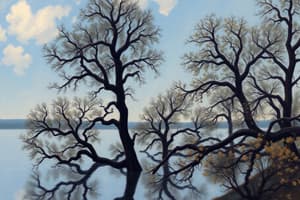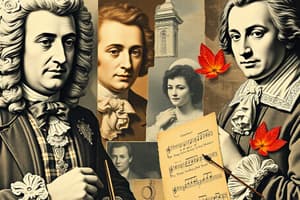Podcast
Questions and Answers
Which of the following describes the characteristics of Homophonic texture?
Which of the following describes the characteristics of Homophonic texture?
- Multiple independent melodies played simultaneously
- Variations of a melody played at the same time
- A single musical line without accompaniment
- Movement accompanying parts in the same rhythms as the melody (correct)
A concerto is a composition for multiple instruments.
A concerto is a composition for multiple instruments.
False (B)
Name the period of music history that took place from 1750 to 1820 in Central Europe.
Name the period of music history that took place from 1750 to 1820 in Central Europe.
Classical
A __________ is a composition for voices and instruments that originated in the 17th century.
A __________ is a composition for voices and instruments that originated in the 17th century.
Match the following terms to their descriptions:
Match the following terms to their descriptions:
Which characteristic distinguishes Classical Music?
Which characteristic distinguishes Classical Music?
Polyphonic texture involves playing two or more independent melodies.
Polyphonic texture involves playing two or more independent melodies.
Who was Franz Joseph Haydn?
Who was Franz Joseph Haydn?
Which of the following composers is known as the 'Father of Symphony'?
Which of the following composers is known as the 'Father of Symphony'?
Beethoven was born in Vienna, Austria.
Beethoven was born in Vienna, Austria.
What significant change did Joseph Haydn bring to the string quartet genre?
What significant change did Joseph Haydn bring to the string quartet genre?
Mozart composed his first opera, ___________, in 1763.
Mozart composed his first opera, ___________, in 1763.
Match each composer with their respective contribution:
Match each composer with their respective contribution:
Which piece did Haydn compose that reflects his love of nature?
Which piece did Haydn compose that reflects his love of nature?
Mozart began performing publicly at the age of 10.
Mozart began performing publicly at the age of 10.
In which year did Beethoven arrive in Vienna to study with Mozart?
In which year did Beethoven arrive in Vienna to study with Mozart?
Beethoven was born in ____________ in 1770.
Beethoven was born in ____________ in 1770.
Who was the ruler that employed Mozart as a court musician in Salzburg?
Who was the ruler that employed Mozart as a court musician in Salzburg?
Which artist is known for the oil painting 'Portrait of Pope Innocent X'?
Which artist is known for the oil painting 'Portrait of Pope Innocent X'?
Peter Paul Rubens created the original painting of 'Venus with a Mirror'.
Peter Paul Rubens created the original painting of 'Venus with a Mirror'.
What is the primary theme of Rembrandt's painting 'The Return of the Prodigal Son'?
What is the primary theme of Rembrandt's painting 'The Return of the Prodigal Son'?
The __________ is a musical composition designed to be played by the full orchestra.
The __________ is a musical composition designed to be played by the full orchestra.
Match the following composers to their famous works:
Match the following composers to their famous works:
Which Baroque artist was known for his bold brushwork?
Which Baroque artist was known for his bold brushwork?
The term 'Sonare' translates to 'to create music' in Italian.
The term 'Sonare' translates to 'to create music' in Italian.
What is the significance of 'Las Meninas' in art history?
What is the significance of 'Las Meninas' in art history?
Gian Lorenzo Bernini is credited with creating the Baroque style of __________.
Gian Lorenzo Bernini is credited with creating the Baroque style of __________.
Which of the following describes the general texture of classical music?
Which of the following describes the general texture of classical music?
Which composition did Beethoven dedicate and perform in the house of Prince Lichnowsky?
Which composition did Beethoven dedicate and perform in the house of Prince Lichnowsky?
Beethoven got married during his lifetime.
Beethoven got married during his lifetime.
What is the term used for a musical composition meant for a solo instrument with orchestral accompaniment?
What is the term used for a musical composition meant for a solo instrument with orchestral accompaniment?
The __________ of Prometheus was a popular ballet composed by Beethoven in 1801.
The __________ of Prometheus was a popular ballet composed by Beethoven in 1801.
Match the following artists with their works:
Match the following artists with their works:
What is the structure of Sonata-Allegro form?
What is the structure of Sonata-Allegro form?
The moonlight sonata is an example of a sonata composition.
The moonlight sonata is an example of a sonata composition.
What was Beethoven's last completed symphony?
What was Beethoven's last completed symphony?
Beethoven struggled to accept his impending __________.
Beethoven struggled to accept his impending __________.
Which of the following was a collaboration Beethoven had in his studies?
Which of the following was a collaboration Beethoven had in his studies?
The Baroque period is characterized by dramatic lighting and realistic portrayals in art.
The Baroque period is characterized by dramatic lighting and realistic portrayals in art.
What type of painting represents the last dinner between Jesus and his disciples before the crucifixion?
What type of painting represents the last dinner between Jesus and his disciples before the crucifixion?
The __________ depicts St. Mary Magdalene as a haggard figure emphasizing spiritual depth.
The __________ depicts St. Mary Magdalene as a haggard figure emphasizing spiritual depth.
Match the following compositions with their years of publication or performance:
Match the following compositions with their years of publication or performance:
Flashcards
Monophonic
Monophonic
A single musical line without accompaniment. Think of a solo instrument playing a melody.
Heterophonic
Heterophonic
Multiple variations of the melody are played simultaneously. Think of several musicians playing different versions of the same tune at the same time.
Polyphonic
Polyphonic
Two or more independent melodies are played at the same time. Think of two different songs playing together.
Concerto
Concerto
Signup and view all the flashcards
Symphony
Symphony
Signup and view all the flashcards
Homophonic
Homophonic
Signup and view all the flashcards
Kantata
Kantata
Signup and view all the flashcards
Classical
Classical
Signup and view all the flashcards
Baroque
Baroque
Signup and view all the flashcards
Bernini
Bernini
Signup and view all the flashcards
Sonata Allegro Form
Sonata Allegro Form
Signup and view all the flashcards
Rembrandt
Rembrandt
Signup and view all the flashcards
Rubens
Rubens
Signup and view all the flashcards
Velazquez
Velazquez
Signup and view all the flashcards
Titian (Tiziano Vecellio)
Titian (Tiziano Vecellio)
Signup and view all the flashcards
Who is Joseph Haydn?
Who is Joseph Haydn?
Signup and view all the flashcards
What are some characteristics of Wolfgang Mozart's work?
What are some characteristics of Wolfgang Mozart's work?
Signup and view all the flashcards
What is Mozart's musical journey like?
What is Mozart's musical journey like?
Signup and view all the flashcards
How did Mozart's early life shape his musical development?
How did Mozart's early life shape his musical development?
Signup and view all the flashcards
Who was Ludwig van Beethoven and what did he achieve?
Who was Ludwig van Beethoven and what did he achieve?
Signup and view all the flashcards
How did Beethoven's musical education unfold?
How did Beethoven's musical education unfold?
Signup and view all the flashcards
How was Haydn's music received in Europe and what did he compose for public concerts?
How was Haydn's music received in Europe and what did he compose for public concerts?
Signup and view all the flashcards
What are some defining characteristics of Mozart's musical talents?
What are some defining characteristics of Mozart's musical talents?
Signup and view all the flashcards
What distinguishes Mozart's musical style?
What distinguishes Mozart's musical style?
Signup and view all the flashcards
Explain the significance of Mozart's piano concerto compositions?
Explain the significance of Mozart's piano concerto compositions?
Signup and view all the flashcards
Sonata
Sonata
Signup and view all the flashcards
Exposition
Exposition
Signup and view all the flashcards
Development
Development
Signup and view all the flashcards
Recapitulation
Recapitulation
Signup and view all the flashcards
Leonardo da Vinci
Leonardo da Vinci
Signup and view all the flashcards
Michelangelo Buonarroti
Michelangelo Buonarroti
Signup and view all the flashcards
Raphael Sanzio
Raphael Sanzio
Signup and view all the flashcards
Donatello
Donatello
Signup and view all the flashcards
Michael Caravaggio
Michael Caravaggio
Signup and view all the flashcards
The Last Supper
The Last Supper
Signup and view all the flashcards
Mona Lisa
Mona Lisa
Signup and view all the flashcards
The Creation of Adam
The Creation of Adam
Signup and view all the flashcards
The Pieta
The Pieta
Signup and view all the flashcards
La Belle Jardiniere
La Belle Jardiniere
Signup and view all the flashcards
Penitent Magdalene
Penitent Magdalene
Signup and view all the flashcards
The Calling of Saint Matthew
The Calling of Saint Matthew
Signup and view all the flashcards
Study Notes
Music History and Forms
- Monophonic: Single musical line without accompaniment.
- Homophonic: Melodies and accompanying parts, same rhythm.
- Heterophonic: Multiple variations of a melody played simultaneously.
- Polyphonic: Two or more independent melodies played.
- Sonata: Solo or small ensemble instrument piece.
- Concerto: Composition for a solo instrument and orchestra.
- Kantata: Composition for voices and instruments, 17th century origins.
- Symphony: Large-scale composition for orchestra.
- Opera: Live performance with orchestra telling a story through music.
- Comic Opera: Humorous situations and characters, spoken dialogue.
- Opera Buffa: Comic opera, usually in Italian, everyday life themes.
- Serria Opera: Serious Italian opera, dominant in 18th century.
- Classical Period: 1750–1820, Central Europe, Aristocratic control.
- Classical Music Characteristics: Contrast in mood, unity/logic, homophonic texture, balanced/symmetrical melodies, complex harmony, multiple melodies.
- Classical Composition Rhythms: Sudden pauses, syncopations, frequent note duration changes.
Classical Composers
- Franz Joseph Haydn (1732–1809): Austrian composer, "Father of Symphony" and "Father of the String Quartet".
- Worked for the Esterhazy family.
- Published extensively in Europe, known for symphonies, string quartets, oratorios ("The Creation", "The Seasons").
- Transformed symphonies from entertainment to chamber music.
- Wolfgang Amadeus Mozart (1756–1791): Austrian child prodigy, versatile composer, violinist, and concertmaster.
- Performed in Europe at a young age.
- Composed numerous sonatas, symphonies, masses, concertos, and operas.
- Showcased vivid emotion and sophisticated textures in works, influenced by Bach/Handel.
- Known for many important works and travel with his sister.
- Ludwig van Beethoven (1770–1827): German composer, pianist, and innovator.
- Expanded sonata, symphony, concerto, quartet forms.
- Combined instrumental/vocal forms in new ways, known for masterpieces.
- Studied with Mozart early in career then was a pioneer for later works after achieving fame.
- Became deaf but continued composing, known for Moonlight Sonata, Eroica Symphony, Missa Solemnis, late string quartets.
Music Forms
- Sonata: Musical composition or piece, usually 2–4 sections, related keys.
- Sonata-Allegro Form: Three parts (exposition, development, recapitulation).
- Exposition: Introduction of themes.
- Development: Expansion of themes in new keys.
- Recapitulation: Restatement of themes in the original key. Optional coda.
- Symphony: Extended composition, typically four movements.
- First and fourth movements often fast/lively, second usually slow, third variable.
- Concerto: Usually three movements, fast-slow-fast, solo instrument accompanied by an orchestra.
Arts History
(Brief summaries of Renaissance and Baroque artists)
- Leonardo da Vinci (1452-1519): Italian, High Renaissance, paintings (Mona Lisa, The Last Supper).
- Michelangelo (1475-1564): Italian sculptor, painter, architect, poet, High Renaissance (Creation of Adam, Pieta).
- Raphael (1483-1520): Italian painter, High Renaissance (La Belle Jardiniere).
- Donatello (1386–1466): Italian sculptor, Early Renaissance.
- Caravaggio (1571-1610): Italian painter, Baroque, dramatic use of light.
- Rubens (1577-1640): Flemish artist, Baroque, emphasis on movement, color.
- Velázquez (1599-1660): Spanish painter, Baroque, court artist (Las Meninas).
- Rembrandt (1606-1669): Dutch painter, Golden Age, renowned as a visual artist.
- Bernini (1598-1680): Italian sculptor and architect, Baroque sculpture, David.
Studying That Suits You
Use AI to generate personalized quizzes and flashcards to suit your learning preferences.



